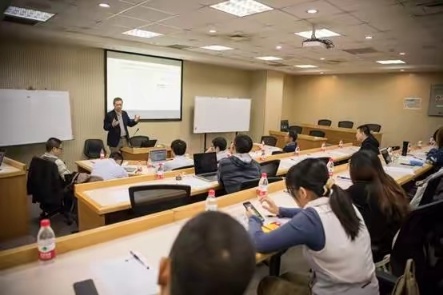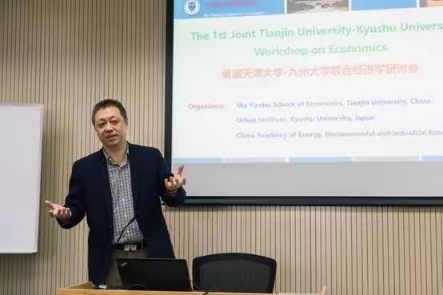
Recently, the 1st Joint Tianjin University-Kyushu University Workshop on Economics was held in Tianjin. It was cosponsored by the Ma Yinchu School of Economics of Tianjin University, the China Academy of Energy, Environmental and Industrial Economics at Tianjin University, and the Urban Institute of Kyushu University, Japan.


Professor Zhang Zhongxiang, Dean of Ma Yinchu School of Economics and Director of the Academy and Professor Shunsuke Managi of the Institute made a brief introduction to the background of the workshop, as well as the Academy and the Institute respectively. They wished to take this opportunity to further their cooperation. Later, Professor Shunsuke was awarded the title of Adjunct Professor of Ma Yinchu School of Economics. Professor Zhang highlighted the major academic achievements of Professor Managi in the awards ceremony.
Professor Managi delivered a speech entitled the “Inclusive Wealth of Nations”. He said that some social welfare issues such as environmental factors have not been taken into consideration in the calculation of GDP, the traditional indicator of economic development, so GDP is not the best indicator to measure the sustainable economic development of a country. For instance, the improvement of GDP may be at the cost of all the natural resources. Managi’s research team worked out a more comprehensive indicator of economic development — the Inclusive Wealth by adding another three factors — carbon consumption, oil capital gains and total factor productivity to indicate the sustainable development of a country. This indicator, in which human capital, natural capital, social capital and manufacturing capital are taken into consideration, indicates that the present economic development in Latin America, the Middle East and Asia is unsustainable. Additionally, the Inclusive Wealth can also better reflect the ultimate objective of the government’s work. Managi suggested that this indicator can be put into application in provinces, cities and even towns.
Associate Professor Hanjoon Jung focused on the impact of corruption on the labor market and economic growth.
Doctor Shuichi Tsugawa said in his research that governments should equip cities with facilities that private sectors can hardly provide, such as libraries. Those facilities can be taken as public goods. Tsugawa also talked about the bipolar situation of utilitarianism and Rawlsianism, as well as the output of personal wealth in the environment of rapid economic growth and low net profit growth.
Assistant Professor Wataru Nozawa gave a report concerning board composition, corporate environmental strategy and financial performance.
In his report concerning the shared responsibility of carbon reduction with the perspective of global industrial division, Professor Zhang mentioned that in traditional trade patterns, goods only cross boarders once, which brings about a simple carbon transferring path, so the carbon emissions from the production end to the consumption end can be measured easily. However, with the development of global industrial division and decentralization of spatial production, the production chain may involve many countries in several continents. As a result, the destination of production supply, the origin of carbon emission and the place of consumption are further separated, and the carbon transfer path among countries has become more complicated. Based on the global input-output model and data from World Input-Output Database (WIOD), Zhang analyzed how global industrial division influences the transformation of producer-responsible principle to beneficiary-responsible principle and consumer-responsible principle. He believed that the difficulties of the transformation relate not only to implications of carbon emission, but also to the times goods cross borders. In addition, the difficulty of the transformation from a producer-responsible principle to a beneficiary- and consumer- responsible principle is increasing, while the effectiveness of the latter two is decreasing. Zhang also showed the carbon transferring path and the connection between the producer end calculation and the consumption end calculation.
Assistant Professor Moinul Islam evaluated the monetary value of natural capital and ecosystem services with the Inclusive Wealth.
In the end, Dean Zhang concluded the workshop and expressed his gratitude towards all the guests, especially Professor Managi and his team. Zhang said that he hoped this workshop would help to improve the economic research quality of TJU as well as students’ attainments on economics, and further the cooperation between Kyushu University and Tianjin University. They all agreed that the next workshop will be held in Kyushu University.
By: Guo Shuxian, Wu Jingjing
Editors: Sun Xiaofang, Keith Harrington






